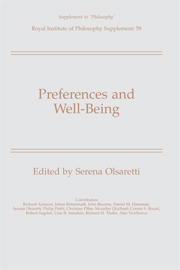Book contents
- Frontmatter
- Contents
- List of Contributors
- “Introduction”
- “Desire Formation and Human Good”
- “Preference Formation and Personal Good”
- “Leading a Life of One's Own: On Well-Being and Narrative Autonomy”
- “Well-Being, Adaptation and Human Limitations”
- “Consequentialism and Preference Formation in Economics and Game Theory”
- “Preferences, Deliberation and Satisfaction”
- “Content-Related and Attitude-Related Reasons for Preferences”
- “Reasoning with Preferences?”
- “Taking Unconsidered Preferences Seriously”
- “Preferences, Paternalism, and Liberty”
- “Preference Change and Interpersonal Comparisons of Welfare”
“Preferences, Deliberation and Satisfaction”
Published online by Cambridge University Press: 07 May 2010
- Frontmatter
- Contents
- List of Contributors
- “Introduction”
- “Desire Formation and Human Good”
- “Preference Formation and Personal Good”
- “Leading a Life of One's Own: On Well-Being and Narrative Autonomy”
- “Well-Being, Adaptation and Human Limitations”
- “Consequentialism and Preference Formation in Economics and Game Theory”
- “Preferences, Deliberation and Satisfaction”
- “Content-Related and Attitude-Related Reasons for Preferences”
- “Reasoning with Preferences?”
- “Taking Unconsidered Preferences Seriously”
- “Preferences, Paternalism, and Liberty”
- “Preference Change and Interpersonal Comparisons of Welfare”
Summary
In his famous lecture on ‘The Concept of Preference’ Amartya Sen (1982) opened up the topic of preference and preference-satisfaction to critical, philosophical debate. He pointed out that preference in the sense in which choice reveals one's preference need not be preference in the sense in which people are personally better off for having their preferences satisfied. And on the basis of that observation he built a powerful critique of some common assumptions in welfare economics.
I endorse Sen's observation and critique and I think that, suitably recast, they can be nicely situated within a broader picture of preference and deliberation that Michael Smith and I developed elsewhere (Pettit and Smith 1990). This paper is an attempt to do just that, sketching an overall picture of the nature of preference, the nature of deliberation, and the way they interact around the idea of preference-satisfaction.
But the paper is not just an attempt to keep the books on these topics; there is also a bottom line. That line is that preference-satisfaction should not normally figure as a deliberative concern. When individuals deliberate about what they ought individually to do, they should not normally focus on what will bring them most preference-satisfaction. And when authorities or commentators deliberate about what good government ought to try to do for its people, they should not normally search for what will maximize the overall preference-satisfaction of people in the community.
- Type
- Chapter
- Information
- Preferences and Well-Being , pp. 131 - 154Publisher: Cambridge University PressPrint publication year: 2006
- 8
- Cited by



